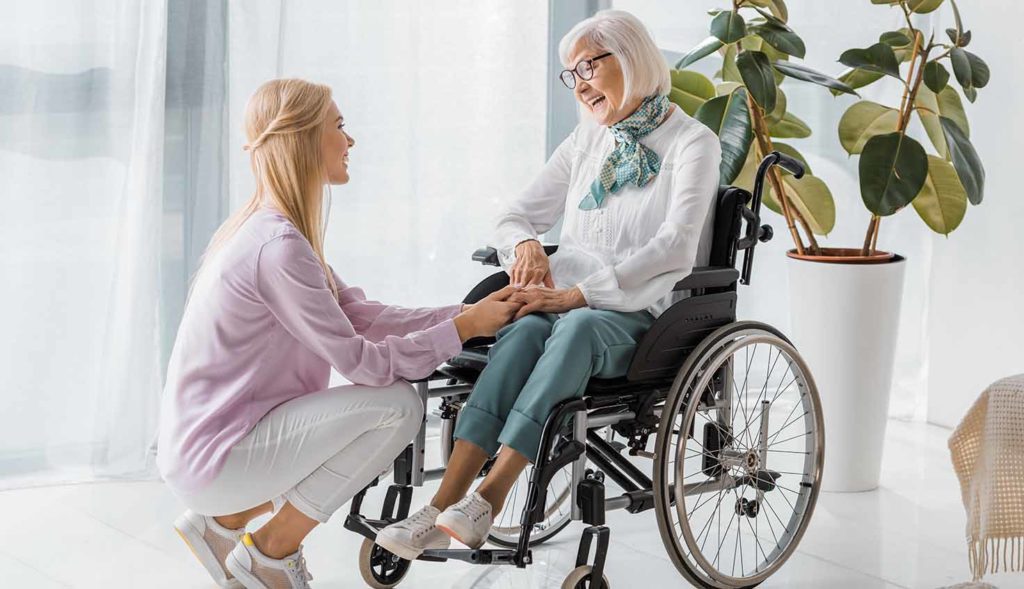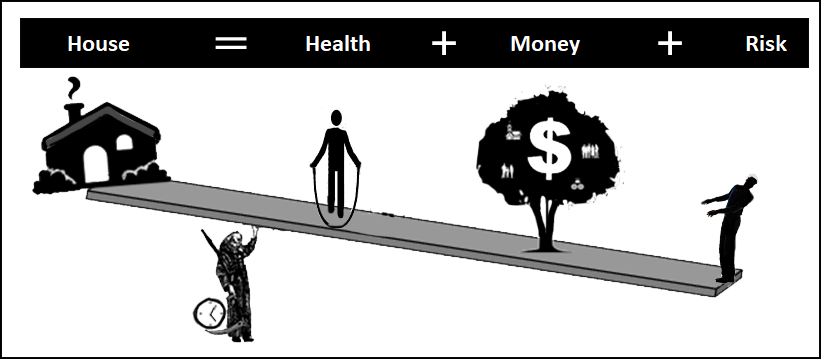Do My Parents Need Nursing Home Care?
Do my parents need to be in a nursing home? The first issue is recognizing that a senior’s view of the world doesn’t necessarily line up with their child’s view. In fact, it’s often at odds. Most seniors never want to go to a nursing home. We discuss nursing homes from a senior’s point of view here. On the other hand, most children want their parents safe and cared for, and at some point, they see the level of care requiring a nursing home.

Nursing Home Care Options Can Be Viewed As An Equation
Before Carmen and I jump in and share your stories, here’s the math. Yes, math. It turns out that our ability to remain in our own home is reduceable to an equation. Carmen and I discovered this during our 1,000 plus interviews with seniors and their families.
As we age, our ability to stay in our own home becomes a function of our health, money (resources) and risk. By health, we refer to the manifestation of our health conditions. We don’t care about the disease, we care about how it affects us day-to-day. If my COPD prevents me from climbing stairs, shopping, and doing housework, I need to get others to do those activities. Likewise, if my stroke has me partially paralyzed and I can’t do any of my ADLs, I need someone to help me do them. If I have lots of money or resources, like a family dedicated to my care, I can afford to have the others compensate for my health.
The Housing Equation

In most cases, I have some abilities and some money. But as I get older I need more help, and I have less money. In other words, I need more help for less money.
Given this reality, gaps emerge in how well I can care for myself. If I’m forgetful and don’t have supervision, I might leave something on the stove and start a fire. If my illnesses make me dizzy and I fall without someone in the house, I risk injuring myself. If I have dementia, I may leave the house and walk into traffic or fall in the yard. In other words, my risks of living at home increase over time.
How The Children Of Seniors View The World
Carmen and I interviewed over 1,000 seniors for CarePlanIt. One of the biggest questions that came up from children of seniors was, “Do my parents need to be in a nursing home?” Kids’ concerns referenced home chores not getting done, parent fall injuries, poor home layouts they thought were dangerous (lots of stairs), high home-related expenses, inability to properly shop and prepare meals, and recurring illnesses.
The first thing we point out is knowing your senior housing options. See our Section on Housing. Families often conflate nursing homes and assisted living facilities. Especially when they’ve waited so long that the Ager is having trouble performing day-to-day activities.
Children were quick to assert the idea that their parents needed to be in a place capable of providing proper care and supervision. At a certain point, we (seniors) cannot do things for ourselves. When our decline is pronounced, assisted living facilities can’t even provide enough help. We need a nursing home. Seniors know this, and they resist their kids trying to move them in this direction.
Senior’s Dislike Housing Interventions By Children
Seniors were upset their children were interfering or trying to interfere, with how they eat, how they clean their house, how they exercise, and whether they go the doctor enough. When we had an opportunity to ask parents their thoughts on the “parent – child housing discussion,” we were often asked, “How do we politely tell our children to butt out?”
The dispute is one about autonomy and risk. Seniors want their autonomy and are willing to take on risks to maintain that autonomy. In holding onto this position, seniors often emphasize or structure their arguments so that the prospect of a nursing home is the worst thing that can ever happen to them.
Senior’s Basic Argument For Rejecting The Need To Be In A Nursing Home
Parents frequently argue nursing homes are for people that can’t do anything, have lost their marbles, don’t have family, or are broke. They often have very negative perceptions of nursing homes like nursing homes kill people; they make people sick, and that’s where people go to die. Parents often questioned how a nursing home could be the best option when all they needed was a little more assistance.
Their children disagree. Concerned children want to minimize the risk to their parents. They often see them as children and are overprotective. Sometimes, they may also recognize that their parent’s resources, and often theirs, may be best spent on a nursing facility. They focus on the best nursing homes and positive things associated with nursing homes like they are now heavily regulated. They have better facilities; do a better job at sanitation; have edible food; and foster community. In addition, they have ice cream and pizza parties; they provide needed supervision for frail seniors; and they provide proper care needed for complex chronic illnesses.
Seniors Don’t Think Of Themselves As Burdens
We all think that we’ll be easy to care for when we are very old or disabled. We think we’ll be able to do some things ourselves, that we’ll be cooperative, that we’ll be kind and thankful. When this is true, our spouse, family, even neighbors often rally to help keep us in our home. But as we continue to age, we get increasingly disabled. It becomes harder for us to move. We face challenges with all our ADLs. We get increasingly demented. We’re more likely to resist help, and become paranoid. We’re more likely to harm ourselves and those around us. We get harder to manage as we age.
When Seniors And Their Children Agree On Nursing Home Care
Regardless, we found certain circumstances where the convergence happened. Seniors and their children agreed that a move was best, and the senior moved into a nursing facility. These most common circumstances included:
> A senior physically harmed themself or a caregiver
> The caregiver spouse dies or also becomes disabled
> More time spent in hospitals and rehabilitation facilities than at home
> Repeated hospitalizations in a short period of time
> Diagnosis of a debilitating chronic or terminal illness
> Spouse believing a caregiving mistake almost caused the death of their spouse
> Home fires
> Mistakes in basic day-to-day management (medication over or under-dosing, falling for financial scams, inability to maintain sanitary home, etc.)
> Senior went broke (qualified for Medicaid nursing facility)
Other Resources On Do My Parents Need Nursing Home Care
See our Sections on Housing and Family Communication.
Learn how a family can help ensure good nursing home care here.